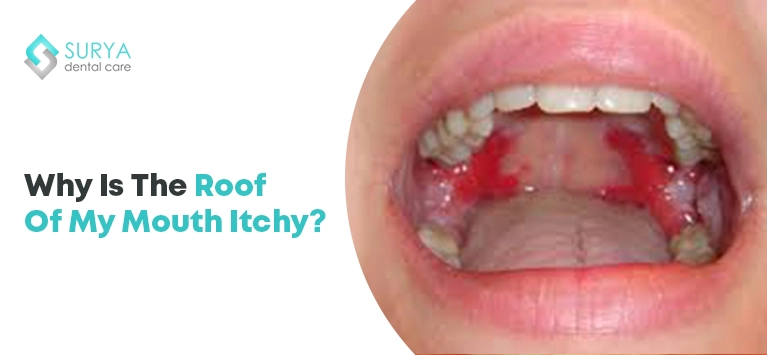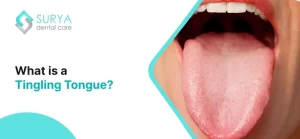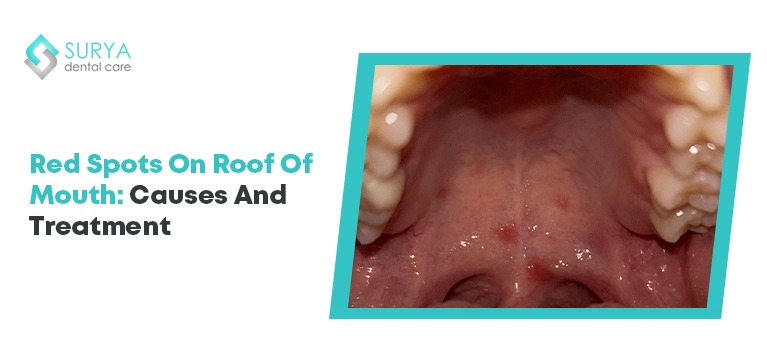If you’ve ever experienced an itchy roof of the mouth, you know just how annoying and uncomfortable it can be. Roof of the mouth is a sensitive area that can become irritated for a variety of reasons due to various viral infections or allergies to certain foods. Sometimes it may also be an alarming symptom of some health issues. In this informative blog post, we’ll explore the common causes of an itchy palate and provide some helpful remedies to find relief.
Itchy Roof of Mouth
Itching upper mouth is caused due to various reasons. It may be majorly caused by the cold in most people. If the symptom exists for less than two weeks you are likely to have a cold. If the condition lasts for more than two weeks consult with a healthcare provider as sometimes itching top of mouth can be an alarming symptom of health issues.
Causes of Itchy Roof of Mouth
There are several potential reasons why the roof of your mouth may be feeling itchy. Let’s dive into the most common culprits
Allergic Reaction
One of the most frequent causes of an itchy palate is an allergic reaction. Allergies can be triggered by certain foods, airborne irritants, or even medications. When the body encounters an allergen, it releases histamine, which can lead to inflammation and itchiness in the mouth, including the roof of the mouth.
Common allergens that may cause an itchy palate include
- Dairy products
- Nuts
- Shellfish
- Wheat
- Pollen (a fine microscopic grains produced by male plants during reproduction)
- Dust mites
Dry Mouth
Saliva plays a crucial role in keeping the mouth moist and prevents us from irritation. When the salivary glands don’t produce enough saliva the palate can become dry, irritated, and itchy. This is how xerostomia or dry mouth can contribute to an itchy roof of the mouth.
Dry mouth can be caused by
- Certain medications (e.g. antihistamines, decongestants, antidepressants)
- Underlying medical conditions (e.g. Sjogren’s syndrome, diabetes)
- Dehydration
- Radiation therapy for head and neck cancers
Oral Thrush
Oral thrush is also known as candidiasis which is a fungal infection that can occur in the mouth including the roof of the mouth. This condition is caused by an overgrowth of the Candida fungus which leads to a white cottage cheese-like coating on the tongue and palate accompanied by itchiness and discomfort.
Oral thrush is more common in individuals with a weakened immune system and those with HIV/AIDS, cancer treatments, or diabetes.
Oral Herpes
Oral herpes is also known as cold sores which can appear on the roof of the mouth, leading to pain, burning, and itchiness. The herpes simplex virus especially the type 1 (HSV- 1) can also cause infections around the mouth that includes itching upper mouth.
Chemical Irritation
Certain foods, beverages, or oral hygiene products can irritate the sensitive tissue of the palate, leading to an itchy sensation. This may be the case with spicy foods, acidic fruits, mouthwashes containing alcohol, or toothpaste containing irritating ingredients. Also using toothpaste containing SLS(sodium lauryl sulfate) Could cause the roof of mouth peeling or skin inside the mouth peeling.
Injuries or Trauma
Physical trauma or irritation to the roof of the mouth such as from biting the palate, burns from hot food or drinks, or ill-fitting dentures, can also result in an itchy sensation.
Home Remedies for Itchy Roof of Mouth
If you’re experiencing an itchy palate, there are several remedies you can try to find relief. They are listed below.
Identify and Avoid Triggers
If your itchy palate is caused by an allergic reaction it is essential to identify and avoid the triggering allergen. Keep a food you consume as a note and pay attention to any patterns or connections between your symptoms and the foods you consume.
Stay Hydrated
Drink plenty of water to keep your mouth moist and reduce the irritation caused by dry mouth. You can also try using a saliva substitute or chewing sugar-free gum to stimulate saliva production.
Practice Good Oral Hygiene
Maintain good oral hygiene by brushing and flossing regularly. Avoid using mouthwashes that contain alcohol as they can further dry out the mouth. Instead opt for a gentle and alcohol-free mouthwash.
Use Topical Treatments
Over-the-counter hydrocortisone creams or ointments can provide temporary relief from an itchy palate. Apply a small amount directly to the affected area by following the instructions on the product. Avoid prolonged use as topical steroids can have side effects.
Try Oral Medications
For more severe or persistent cases of an itchy palate, your healthcare provider may prescribe oral antihistamines or antifungal medications to address the itching upper mouth caused by allergies or oral thrush.
Consider Dietary Changes
If your itchy palate is related to a food allergy or sensitivity then try eliminating potential trigger foods from your diet, such as dairy, nuts, or wheat to see if that provides relief.
Manage Stress
Stress and anxiety can exacerbate various oral health issues that include an itchy palate. Practice stress-reducing techniques such as meditation, deep breathing, or engaging in relaxing activities to reduce your stress and anxiety.
When to Seek Medical Attention
If the itching upper mouth persists for more than 10 – 12 days or is accompanied by other concerning symptoms such as difficulty in swallowing, severe pain, or difficulty breathing, it’s important to seek medical attention.
Takeaway
An itching upper mouth can be a frustrating and uncomfortable experience but understanding the potential causes and trying various remedies can help provide relief. Remember to pay attention to your symptoms, practice good oral hygiene and consult with a dentists if the issue persists or worsens.
FAQs
Dry mouth, irritability from specific meals, or allergies can all cause itching in the upper part of the mouth. It could also point to a dental health problem or infection.
Allergies, dry mouth, infections, or food sensitivity can all result in an irritable, hard palate. For an accurate diagnosis and course of therapy, it is advisable to speak with a healthcare provider if the itching is severe or coexists with other symptoms.
Dry mouth, oral diseases, and allergies (to dust, pollen, or specific foods) can all contribute to an itchy roof of the mouth at night. The discomfort can be lessened by recognizing and avoiding allergies, drinking plenty of water, and practicing proper oral hygiene.
Because allergies trigger the body's immune system, they make the roof of your mouth itchy. Dust and pollen are examples of allergens that cause the production of histamine, which causes irritation and swelling of the oral tissues. This response is a symptom of allergic rhinorrhea.
Itchy roof of the mouth during a cold might be brought on by an allergic reaction or postnasal drip. Itching results from tissue irritation caused by mucus discharge. This pain may also be exacerbated by cold-related inflammation.








